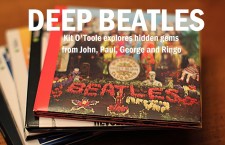Songs can change radically from demo to final version. Nothing demonstrates this fact more than “Child of Nature,” the John Lennon-penned track originally intended for the Beatles’ White Album. Instead, it resurfaced in 1971 not as an ode to transcendentalism, but as a painful confessional.
During time studying under the Maharishi Mahesh Yogi in 1968, the Beatles not only learned about spirituality, but were inspired to write the bulk of what became the White Album. A particular lecture by the Maharishi not only compelled Paul McCartney to write “Mother Nature’s Son,” but Lennon to pen “Child of Nature.”
Paul’s song “was from a lecture of Maharishi where he was talking about nature, and I had a piece called ‘I’m Just a Child of Nature,’ which turned into ‘Jealous Guy’ years later,” Lennon told Playboy in 1980. “Both inspired from the same lecture of Maharishi.” Lennon brought the composition to the Beatles for consideration, recording a demo during the Esher sessions at George Harrison’s home. As Ringo Starr played a shaker, Lennon was featured (double tracked) on acoustic guitar and lead vocal.
For unknown reasons, the Beatles declined to further develop the track for the album. Thematically, “Child of Nature” may have too closely resembled “Mother Nature’s Son”; another theory remains that the idealistic lyrics clashed with raw Lennon compositions such as “Sexy Sadie” or “Yer Blues.” The group dusted off the song during the Get Back sessions, however, as Lennon and Harrison attempted a second version on January 2, 1969.
By this time, the opening lyric featured the following revision: “on the road to Marrakesh” instead of “on the road to Rishikesh.” Lennon may have wanted to distance the song from its original inspiration, since he had become disillusioned by the Maharishi. A full-group rendition was recorded at Apple Studios on January 24, but ultimately failed to make the final cut of Let it Be.
Interestingly, Rolling Stone has posited that Lennon may have intended the lyrics to be interpreted as satire. As evidence, they state that “something about the way he allows his voice to trill with faux folky tremolo on the end of the verses suggests that his country-boy facade is, to some degree, tongue in cheek.” They also theorize that “perhaps the goofy vocal affectations were intended to take some of the sweetness out of the syrupy verses after his feelings on the Maharishi had soured.”
While his vocal affectations could be interpreted in that manner, the earnest lyrics suggest otherwise.
Through the elegant chord changes and his gentle voice, Lennon paints a picture of a man feeling rejuvenated by nature. Indeed, he finds a new identity as “one of nature’s children.” He reveals homesickness that he may have experienced along the way, describing “sunlight shining in your eyes / As I face the desert skies / And my thoughts return to home.” Viewing the mountain range and feeling the wind transform him, Lennon describes the scene as having touched “the windows of my soul.”
By surrendering to nature, by accepting himself as just part of this scene around him, he is set free. He is no longer “John Lennon” but a part of something bigger.
The rest is history: Lennon revisited the track during the Imagine sessions, completely rewriting it to reflect his current life with Yoko Ono. Instead of a celebration of nature, he transforms the words into a highly personal confessional, an admission of his shortcomings. “I didn’t mean to hurt you / I’m sorry that I made you cry / I didn’t want to hurt you / I’m just a jealous guy,” he sings.
A highlight of the Imagine album, “Jealous Guy” may differ thematically from its origins, but both songs hold two aspects in common: they address issues of identity and self-reflection. In sum, they represent Lennon’s skill in writing intensely personal — yet universal — lyrics.
- The Rescued Early Paul McCartney Song That Completed ‘Beatles For Sale’ - December 4, 2024
- A Rare Beatles Cover Proves John Lennon Was Wrong About His Voice - November 26, 2024
- How John Lennon Came Roaring Back on the Beatles’ White Album - November 22, 2023


